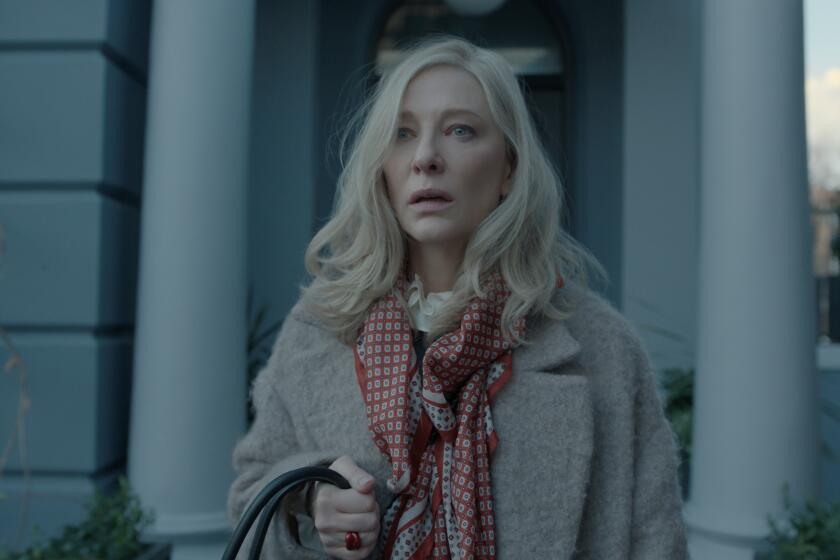Movie review: ‘The Dictator’ rules with crudeness and smarts
Like its creator and star Sacha Baron Cohen, the comedy of “The Dictator” is mercurial to the extreme and as crude as the massive oil reserves of Wadiya, the fictional North African nation where his latest movie prank begins. By turns hysterical, heretical, guilty, innocent, silly, sophisticated, teasing and tedious, the film follows the power-mad leader Admiral General Haffaz Aladeen as he loses his bearings, his beard and his heart in New York City.
“The Dictator” underscores both Baron Cohen’s genius and his folly, and delivers the actor’s signature blend of scatological outrage, sagacity and at least one full-frontal assault with a flaccid unmentionable. Like the girl with the curl, when he is good, he is very, very good, and when he is bad he is horrid.
Working to whip up the mayhem this time, the real people Baron Cohen usually toys with have been replaced by a fine cast of real actors. Anchored by Anna Faris, Ben Kingsley and Jason Mantzoukas, these folks know how to be comic foils whether working from the script by Baron Cohen, Alec Berg, David Mandel and Jeff Schaffer, or improvising under the direction of Larry Charles (“Curb Your Enthusiasm”). It is the same core filmmaking collective that collaborated with Baron Cohen on his first film, the very fresh “Borat: Cultural Learnings of America for Make Benefit Glorious Nation of Kazakhstan” in 2006, followed by the overly ripe fetish of”Bruno” in 2009. “The Dictator” falls somewhere in between, though closer to “Borat” in originality and tone.
The farce starts with snapshots of the general’s life — winning fixed athletic contests, bedding famous females and, most significantly, stockpiling nuclear weapons that he worries aren’t “pointy” enough, while the United Nations worries where they might actually be pointing.
A trip to the U.S., Baron Cohen’s favorite staging ground for ridicule, is, of course, required. There the unraveling of a dictatorship begins with his scheming Uncle Tamir (Kingsley) plotting a coup, NYC health food hippie Zoey (Faris) planning an anti-Aladeen protest and Aladeen himself just wanting to ride his camels down Fifth Avenue. In strange, unpredictable and exceedingly politically incorrect ways, it all comes to pass.
Baron Cohen and crew count heavily on the fish-out-of-water conceit to make the movie work, and so Aladeen is soon beardless, penniless and braving the streets of New York City on his own. A confused, not-exactly-deposed dictator making a mess of most of his encounters allows Baron Cohen’s physical comedy — those gangly limbs, that flat-footed walk, that blank stare — to take center stage.
The good-hearted Zoey soon rescues him and unintentionally begins his re-education. Meanwhile Tamir is working on some black-market oil deals to enrich himself, while the illiterate Aladeen look-alike he’s found to stand in for the dictator (also played by Baron Cohen) spends time grooming his goat instead of practicing the U.N. speech he’s supposed to deliver. A lot more stuff happens, including torture and tourism.
Coming on the heels of the Arab Spring, the satire should feel especially relevant, but there is so much silliness it’s hard to take anything here that seriously. The international news does provide “The Dictator” a lot of political hay, with Baron Cohen taking as many jabs at “democratic” systems of government as dictatorships. Satirizing the political side of things — from all sides — has long been the sweet spot of Baron Cohen’s comedy. In his previous films, particularly “Borat,” the comic was able to expose and exploit human nature using his unstaged encounters with various upright citizens. (Recall the Southern hospitality that Borat received from some right-wingers?) Adding actors and a script to the equation changes the dynamic — the performances in “The Dictator” are more polished, but some of the serendipity and surprise is lost in the process.
Kingsley and Baron Cohen tap into some of the chemistry that they found playing off of each other in Martin Scorsese’s”Hugo.” But Faris is the film’s standout. She is almost unrecognizable as the boyish Zoey — her blond locks shorn pixie short and dyed a mousy brown, her makeup almost nonexistent and her armpit hair homegrown. But when she opens her mouth, that rasp that has made her so much fun to watch (the “Scary Movie” franchise most memorably) takes hold and turns the dialogue inside out. The kind of true-believer purity she brings to Zoey’s eco-terrorizing rants comes close to stealing Baron Cohen’s comic thunder.
That’s easier to do when the laughs are tied to Aladeen’s most basic of bodily functions. Harder to top are the times when Baron Cohen’s mind is mined — a scene with Aladeen trying to come up with a fake name when he stumbles into a restaurant for disaffected Wadiyan expats is priceless. The movie’s high point, though, is at the U.N., where facts, simply stated, make for searing satire.
Still, by the end it’s hard not to think that this particular joke has gone on too long. Perhaps it is time for Baron Cohen to have a go at pushing other acting boundaries harder, and give the Borats, the Brunos, the Aladeens of the world, and us, a rest.
More to Read
The biggest entertainment stories
Get our big stories about Hollywood, film, television, music, arts, culture and more right in your inbox as soon as they publish.
You may occasionally receive promotional content from the Los Angeles Times.











